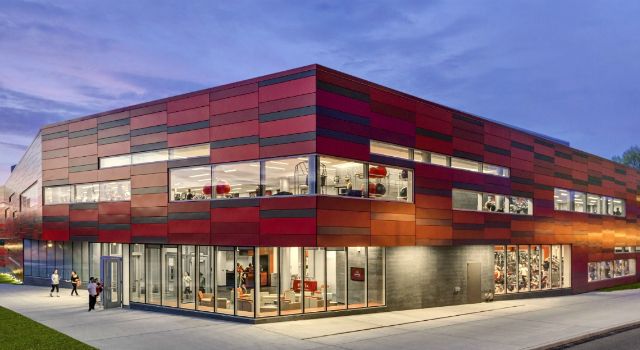Photo from stonybrook.edu
By Sophia Ricco
Contributing Writer
Wind whips past as a pack of runners move in form along the loop, the skid of basketballs colliding with the floor and feet pounding filling up the gymnasium with sound; look right and look left, and every mat is covered with the active bodies of students– each working towards their ideal self.
Whether it is for resolutions set in the new year, a way for students to destress or to avoid the commonly feared “Freshman 15”– the Campus Recreation Center has been at its peak for student usage since the semester began.
“Just in this past week alone I’ve gotten a lot of emails from students who were interested in personal training,” Laura Fitzgerald, Assistant Director of Fitness & Wellness Programs at Campus Recreation. “And they were saying, ‘It’s my New Year’s Resolution to get healthy and get fit.’”
In a survey of college students, it was found on average college freshman gain 2.5 to 3.5 pounds their first year and will typically exhibit a steady weight gain during and after college. This poses a challenge to the staff at the Campus Recreation Center on how to make sure each student is able to achieve their fitness goals while staying motivated and engaged.
“The good thing about fitness is that it’s ever changing,” Fitzgerald said. “There’s always something new and we try to bring that here.”
At the end of last semester, Campus Recreation surveyed students to get better insight into what students were interested in having at the recreation center. Many favored more group fitness classes, which led to recreation center increasing their amount from 22 classes the previous spring semester to over 50 this spring semester.
“There are so many classes offered here that no matter what type of person you are– you’re gonna find a class that speaks to you,” Erin Maurno, a first year graduate student, said. “Having so many classes here is so important for the mental health, as well as the physical health of students on campus.”
Group fitness classes are typically led by student instructors who have a desire to provide their fellow peers an opportunity to try something they may never have experienced before, like belly dancing and spinning, or continue to do what they love to stay fit.
“We have group fitness classes that always change,” Souza said. “Even within the class itself, the instructors know that they are not gonna do the same thing every single time, they do change it up.”
In these classes, students will move as a group through various fitness activities, a unique experience that they are sharing together. They can also gain this experience by joining the many club and intramural sports that practice at the Recreation Center. A sense of camaraderie only amplifies the benefits of fitness, giving many students a fun, social outlet.
“Having a group of guys that I can run and continue to train with motivates me to keep my edge sharp and work hard,” Adeel Azim, a member of the Running Club who utilizes the indoor track in the recreation center, said.
One study found that, those who exercised with partners or in teams, had improved performance and would work out for longer than those who exercised alone, due to the motivation others around can bring.
“Physical health is a big part of overall health,” Rosanny Bivieca, a senior psychology and sociology major, said. “There’s a lot of chemicals released while we exercise and if we don’t have our physical health, it can cause a lot of damage to your body.”
The Campus Recreation Center hopes to not only improve student’s fitness but their overall health and wellness through educational classes that are taught by peer educators. These classes cover a variety of topics from nutrition to HIV awareness.
“Students will find that they are more in control of their choices for health,” Souza said. “People who exercise tend to gravitate toward healthier lifestyle choices, like better nutrition, and tend to get better sleep.”
Even though, the recreation center will only be present in student’s lives during their years of college, the staff hopes it will have a lasting impact on the student’s who take advantage of it.
“Our goal is that when you leave campus, you leave with a desire to remain in a healthy state of mind,” Souza said. “We’re always trying to provide educational and participatory opportunities so you pick up some things along the way and later on say, ‘Oh I remember when I used to do that, I felt really good.’”


